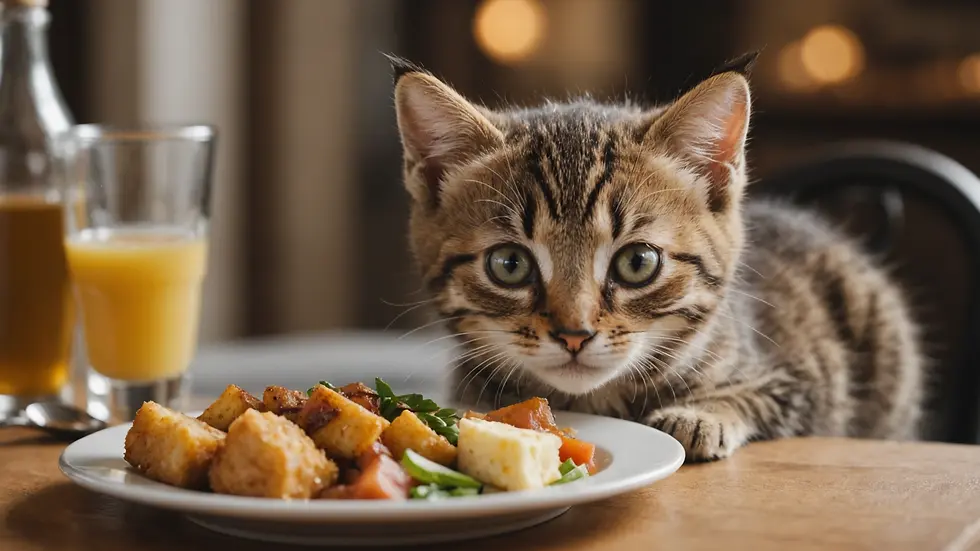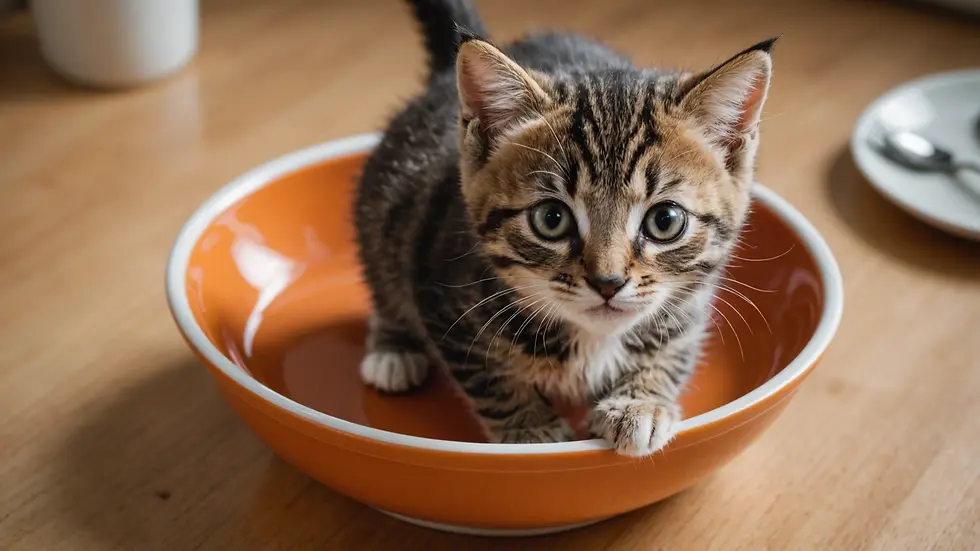How Can I Ensure My Kitten's Diet is Balanced? A Comprehensive Nutrition Guide
- Jyotiraj Borah
- Feb 8
- 4 min read
Creating a balanced diet for your kitten is vital for their growth and health. A well-nourished kitten thrives physically and emotionally, laying a strong foundation for a joyful adult cat. Understanding your kitten's nutritional needs can seem daunting, but this guide breaks down everything you need to make informed choices for your new furry companion.
We will cover the key components of a balanced kitten diet, tips for selecting the best food, and daily feeding recommendations. We’ll also highlight the importance of hydration and provide guidance on transitioning your kitten to dry food when necessary.
Understanding Kitten Nutrition
Like human babies, kittens need a specific mix of nutrients to grow and develop properly. A balanced diet should consist of proteins, fats, carbohydrates, vitamins, and minerals.
Proteins
Kittens are obligate carnivores, requiring a diet rich in animal proteins. These proteins are vital for muscle growth, organ function, and overall health. Always look for high-quality protein sources as the first ingredient in your kitten's food, such as chicken, turkey, or fish. For context, a 3-month-old kitten may need approximately 30-40% protein in their diet to support rapid growth.
Fats
Fats are essential for energy and good skin and coat health. Specific fatty acids, like Omega-3 and Omega-6, play crucial roles in brain development and a strong immune system. When choosing kitten food, seek out those enriched with beneficial fat sources.
Carbohydrates
While cats primarily need proteins and fats, carbohydrates also contribute to their energy and digestive health. Opt for kitten foods with moderate levels of wholesome grains, such as brown rice or oats. Avoid foods filled with empty fillers like corn or soy, which offer little nutritional value.
Vitamins and Minerals
Key vitamins and minerals support kittens' development. Important nutrients include calcium, phosphorus, zinc, and a variety of vitamins, such as A, D, and E. Most commercially prepared kitten food meets these requirements, but always check the labeling to confirm they meet the AAFCO (Association of American Feed Control Officials) standards.
Choosing the Right Kitten Food
When selecting food for your kitten, consider these guidelines:
Type of Food
Dry Kibble: Convenient and helps keep teeth cleaner, but lacks moisture.
Wet Food: Canned food provides hydration and can be more appealing to some kittens, though it tends to be pricier.
Raw Diets: Some owners opt for raw foods; however, ensure these diets meet your kitten's nutrition needs and are prepared safely.
Life Stage Specific Formulas
Kitten food is specially crafted to cater to growing cats’ unique needs. Avoid feeding adult cat food during this stage, as it may lack essential nutrients required for proper development.
Quality Over Price
Investing in premium kitten food is essential. Budget brands often contain fillers and lack vital nutrition. Premium brands usually have better ingredients, ensuring your kitten's health.

Determining Portion Sizes
Feeding the right portion is crucial. Overfeeding can lead to obesity, which may result in lifelong health issues, while underfeeding can stunt growth.
Feeding Guidelines
Always refer to the feeding guidelines on the food packaging. Generally, kittens aged 2 to 6 months should eat three to four meals a day. As they grow, reduce this to two meals daily.
Monitor Your Kitten's Weight
Regularly check your kitten's weight and body condition. You should feel their ribs without too much pressure, and their waist should be visible when viewed from above. Adjust the portion sizes as needed based on these observations.
Hydration: An Often-Overlooked Element
Hydration is a critical but often ignored part of a balanced diet.
Importance of Water
Kittens, similar to adult cats, may not drink enough water. Encourage your kitten to drink more, especially if they primarily eat dry food.
Encouraging Hydration
Fresh Water: Always provide fresh, clean water daily.
Cat Fountains: Cats often prefer fresh, running water. Consider getting a cat water fountain to encourage hydration.
Wet Food: Including wet food in their diet boosts their overall hydration.
Transitioning from Kitten Food to Adult Food
As your kitten matures, you will need to transition them from kitten to adult food, usually between 12 to 18 months.
Gradual Transition
To avoid digestive issues, gradually introduce adult food by blending it with kitten food over a week. Slowly increase the portion of adult food while decreasing kitten food until the transition is complete.
Choosing Adult Cat Food
When selecting an adult cat food, prioritize high-quality protein sources and ensure it meets your cat's different energy needs. Adult cat food often varies significantly from kitten food in fat content and calories, so choose the right formula.

Common Nutritional Pitfalls to Avoid
When feeding your kitten, be wary of these common mistakes:
Table Scraps
Feeding table scraps can lead to nutritional imbalances and promote unhealthy eating habits. Stick to a complete and balanced kitten formula to meet their needs.
Overrelying on Treats
While treats are a great way to reward your kitten, they should not comprise more than 10% of their daily calories. Choose healthy treats and use them sparingly.
Diet Changes
Avoid sudden drastic changes in your kitten's diet to prevent digestive upset. Always transition gradually and consult your vet before trying new brands or formulas.
Consulting with Your Veterinarian
Regular vet visits are essential for monitoring your kitten’s health and nutrition. Your vet can provide tailored advice on diet changes or any special dietary needs based on your kitten’s health history.
Weight and Health Assessments
During vet visits, your kitten will be weighed to ensure they are growing properly and not facing nutritional deficiencies.

Wrapping Up
Creating a balanced diet for your kitten is key to their health and development. Provide high-quality kitten food rich in proteins and fats, ensure they stay hydrated, and adjust their diet as they grow.
Regular veterinarian check-ups are crucial for monitoring their dietary needs and overall well-being. By following these guidelines, you can help your kitten thrive as they grow into a strong and happy adult cat. Adapting their nutritional needs takes some effort, but with the right knowledge, you can offer the best care for your feline friend.




コメント